
The Orange Free State was an independent Boer sovereign republic under British suzerainty in Southern Africa during the second half of the 19th century, which ceased to exist after it was defeated and surrendered to the British Empire at the end of the Second Boer War in 1902. It is one of the three historical precursors to the present-day Free State province.

The Boer republics were independent, self-governing republics formed by Dutch-speaking inhabitants of the Cape Colony and their descendants. The founders – variously named Trekboers, Boers, and Voortrekkers – settled mainly in the middle, northern, north-eastern and eastern parts of present-day South Africa. Two of the Boer republics achieved international recognition and complete independence: the South African Republic and the Orange Free State. The republics did not provide for the separation of church and state, initially allowing only the Dutch Reformed Church, and later also other Protestant churches in the Calvinist tradition. The republics came to an end after the Second Boer War of 1899–1902, which resulted in British annexation and later incorporation of their lands into the Union of South Africa.
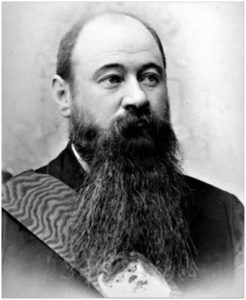
MartinusTheunis Steyn was a South African lawyer, politician, and statesman. He was the sixth and last president of the independent Orange Free State from 1896 to 1902.

The Volksraad of the South African Republic was the parliament of the former South African Republic (ZAR), it existed from 1840 to 1877, and from 1881 to 1902 in part of what is now South Africa. The body ceased to exist after the British Empire's victory in the Second Anglo-Boer War. The Volksraad sat in session in Ou Raadsaal in Church Square, Pretoria.
The following lists events that happened during 1856 in South Africa.

The Province of the Orange Free State, commonly referred to as the Orange Free State, Free State or by its abbreviation OFS, was one of the four provinces of South Africa from 1910 to 1994. After 27 April 1994 it was dissolved following the first non-racial election in South Africa. It is now called the Free State Province.

Francis William Reitz, Jr. was a South African lawyer, politician, statesman, publicist, and poet who was a member of parliament of the Cape Colony, Chief Justice and fifth State President of the Orange Free State, State Secretary of the South African Republic at the time of the Second Boer War, and the first president of the Senate of the Union of South Africa.
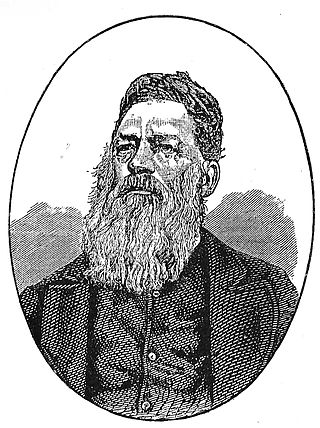
Josias Philip Hoffman was a South African Boer statesman, and was the chairman of the Provisional Government and later the first State President of the Orange Free State, in office from 1854 to 1855.
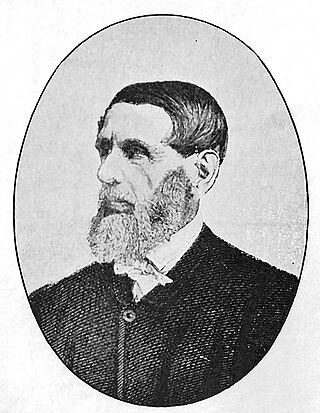
Jacobus Nicolaas Boshof was a South African (Boer) statesman, a late-arriving member of the Voortrekker movement, and the second state president of the Orange Free State, in office from 1855 to 1859.

The flag of the Orange Free State was officially used from 1857 to 1902. It was superseded by the flag of the Orange River Colony.

Hendrik Pieter Nicolaas Muller was a Dutch entrepreneur, diplomat, and publicist who started his career as a businessman, trading with East and West Africa. In his mid-twenties he travelled to Zanzibar, Mozambique, and South Africa for business purposes, but showed himself a keen ethnographer as well.

Pieter Jeremias Blignaut was a South African (Boer) civil servant, Government Secretary of the Orange Free State (1879–1902), and served twice as Acting State President, first after the death of President Brand (1888–1889), and again after the resignation of President Reitz in 1895–1896. After the conclusion of the South African War, Blignaut served as member of both the legislative council and the Legislative Assembly of the Orange River Colony. He was also a member of several state commissions.
Jacobus Groenendaal was a South African statesman of Dutch origin, member of the Volksraad of the Orange Free State and the republic's first Treasurer General and Government Secretary in office from 1854 to 1855 and 1856 respectively.
Jan Willem Spruyt, also known as Jan Willem Spruijt and Jan Willem Landskroon Spruijt (birthname), was a South African civil servant, lawyer and statesman of Dutch descent. Spruyt was government secretary (1856–1862) and several times acting state president of the Orange Free State, and state secretary of the South African Republic (1866–1869).
Johan Arnold Smellekamp was a Dutchman who pioneered trade with the Boer Voortrekker states in South Africa and later became a civil servant, politician and law agent in the Orange Free State.
Cornelis Hiddingh, RNL was a Dutch Cape Colony born lawyer and civil servant. He acted as special envoy to the Orange Free State and South African Republic from 1855–1856. He was consul general of the Orange Free State in the Netherlands between 1861 and 1871.
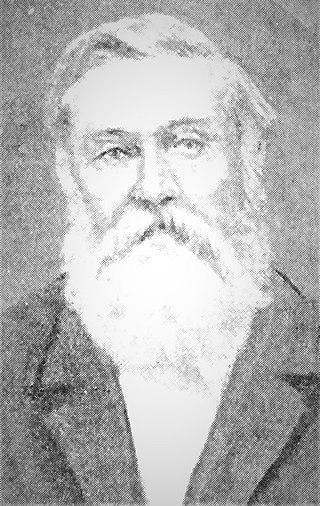
Marthinus Prinsloo was an Orange Free State Boer farmer, politician and general in the Second Boer War (1899-1902). He was born of Nicolaas Frans Prinsloo (1813-1890) and Isabella Johanna Petronella Rautenbach in the district of Graaff-Reinet, South Africa who migrated to the Orange Free State where they lived in Bloemfontein, Waterval and Bethlehem.
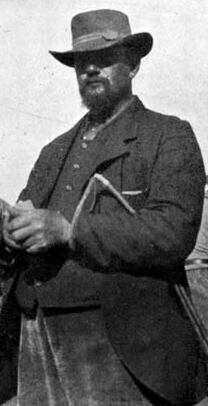
Pieter Daniël de Wet was a Boer general in the Anglo-Boer War (1899–1902) and a younger brother of Boer general and politician Christiaan de Wet. Piet de Wet participated in the Battle of Poplar Grove, the Battle of Sanna's Post for the waterworks there, and defeated the 13th Battalion Imperial Yeomanry at Lindley. In July 1900, he surrendered to the British at Kroonstad, Orange Free State. He became a prominent member of the National Scouts helping the British in the last years of the Boer War.
Petrus "Piet" Johannes Fourie was a Boer general for the Orange Free State in the Anglo-Boer War (1899–1902) in South Africa. He should not be confused with his Boer colleagues generals Joachim Christoffel Fourie (1845–1900) and Christiaan Ernst Fourie (1858–1943).
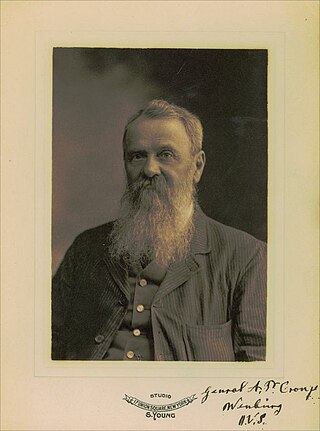
Andries Petrus Cronjé was a Second Boer War Boer general and a member of the Orange Free State Volksraad and the Orange River Colony parliament. He should not be confused with Boer general Andries Petrus Johannes Cronjé, who surrendered and cooperated with the British in the National Scouts.














